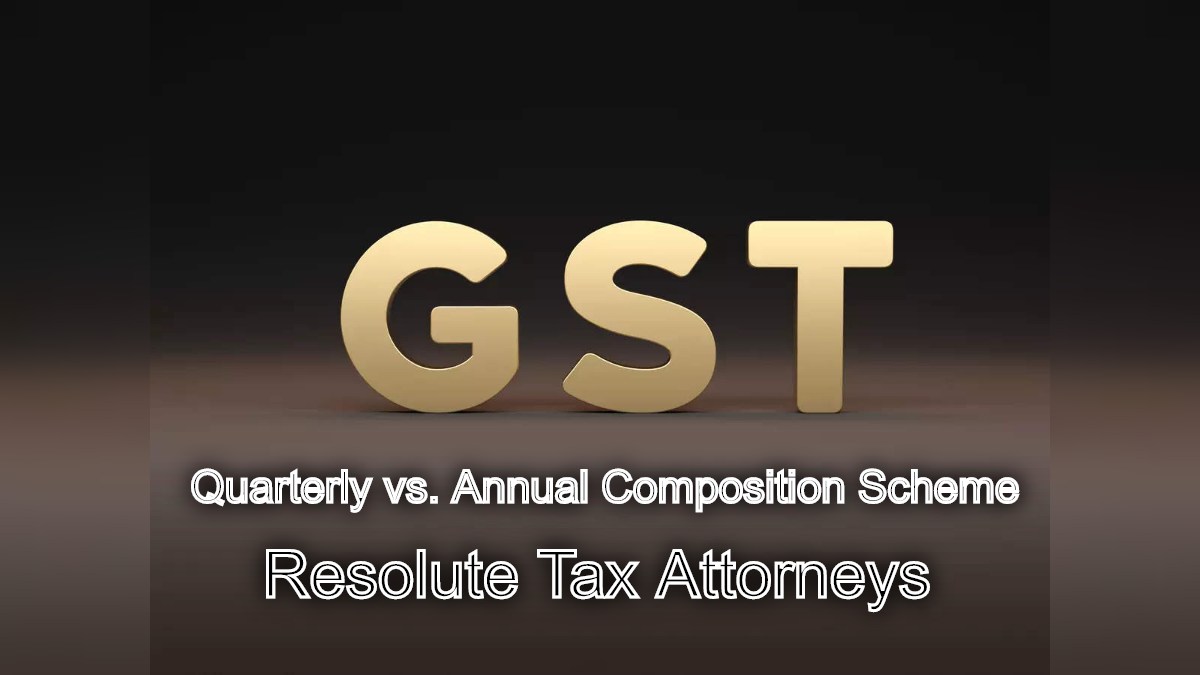Quarterly vs Annual Composition Scheme: Best Option for Your Business - Resolute Tax Attorneys
Quarterly vs. Annual Composition Scheme: Choosing the Right Option
The Goods and Services Tax (GST) regime in India offers taxpayers the flexibility to opt for either the quarterly or annual composition scheme. While both schemes simplify tax compliance for small businesses, understanding their nuances is crucial for making the right choice. This article will delve into the key differences between the two schemes, helping you determine the most suitable option for your business.

Understanding the Composition Schemes
The composition scheme is a simplified tax regime designed to reduce compliance burden for small taxpayers. Under this scheme, taxpayers pay a fixed percentage of their annual turnover as GST.
- Quarterly Composition Scheme: Taxpayers opting for this scheme are required to pay GST on a quarterly basis. This option provides more liquidity but involves slightly higher compliance requirements compared to the annual scheme.
- Annual Composition Scheme: In this scheme, taxpayers pay the entire GST amount in a single installment at the end of the financial year. This option offers lower compliance burden but reduces liquidity.
Factors to Consider When Choosing
The decision to opt for quarterly or annual composition scheme depends on several factors:
- Business Turnover: The turnover of your business is a crucial determinant. If your business has a stable and predictable income throughout the year, the annual scheme might be suitable. However, if your business experiences significant seasonal fluctuations, the quarterly scheme offers more flexibility.
- Cash Flow: The quarterly scheme provides better cash flow management as tax payments are spread throughout the year. If your business faces cash flow challenges, the quarterly option might be preferable.
- Compliance Burden: The annual scheme has lower compliance requirements compared to the quarterly scheme. If your business has limited resources for tax compliance, the annual scheme can be advantageous.
- Business Nature: The nature of your business also plays a role. Businesses with a consistent income stream might find the annual scheme more convenient, while those with irregular income patterns might prefer the quarterly scheme.
Advantages and Disadvantages
Quarterly Composition Scheme
- Advantages: Better cash flow management, flexibility to adjust to business fluctuations.
- Disadvantages: Higher compliance burden, requires more frequent tax calculations.
Annual Composition Scheme
- Advantages: Lower compliance burden, simpler tax calculations.
- Disadvantages: Potential cash flow challenges, lack of flexibility.
Transition Between Schemes
If you find that the chosen scheme is not suitable for your business, you can transition to the other scheme under certain conditions. However, there are specific rules and timelines for such transitions. It is advisable to consult with a tax professional to understand the process and eligibility criteria.
Read More
- Resolute Tax Attorneys: Expert GST Lawyers
- GST Litigation and Taxation in India: A Comprehensive Guide
- GST Dispute Resolution: How to Navigate the Legal System?
- Get Expert GST Registration and Compliance Services for Your Business
- Understanding GST Refund Process: Step-by-Step Guide for Businesses
- GST Portal:
Resolute Tax Attorneys: Your Trusted Advisor
Making the right choice between quarterly and annual composition schemes is crucial for the financial health of your business. Resolute Tax Attorneys offers expert guidance and support to help you navigate the complexities of GST compliance. Our team of experienced professionals can assess your business's specific needs and recommend the most appropriate scheme for you. By understanding the key differences between the two schemes and considering your business's unique circumstances, you can make an informed decision that optimizes your tax liabilities and cash flow.